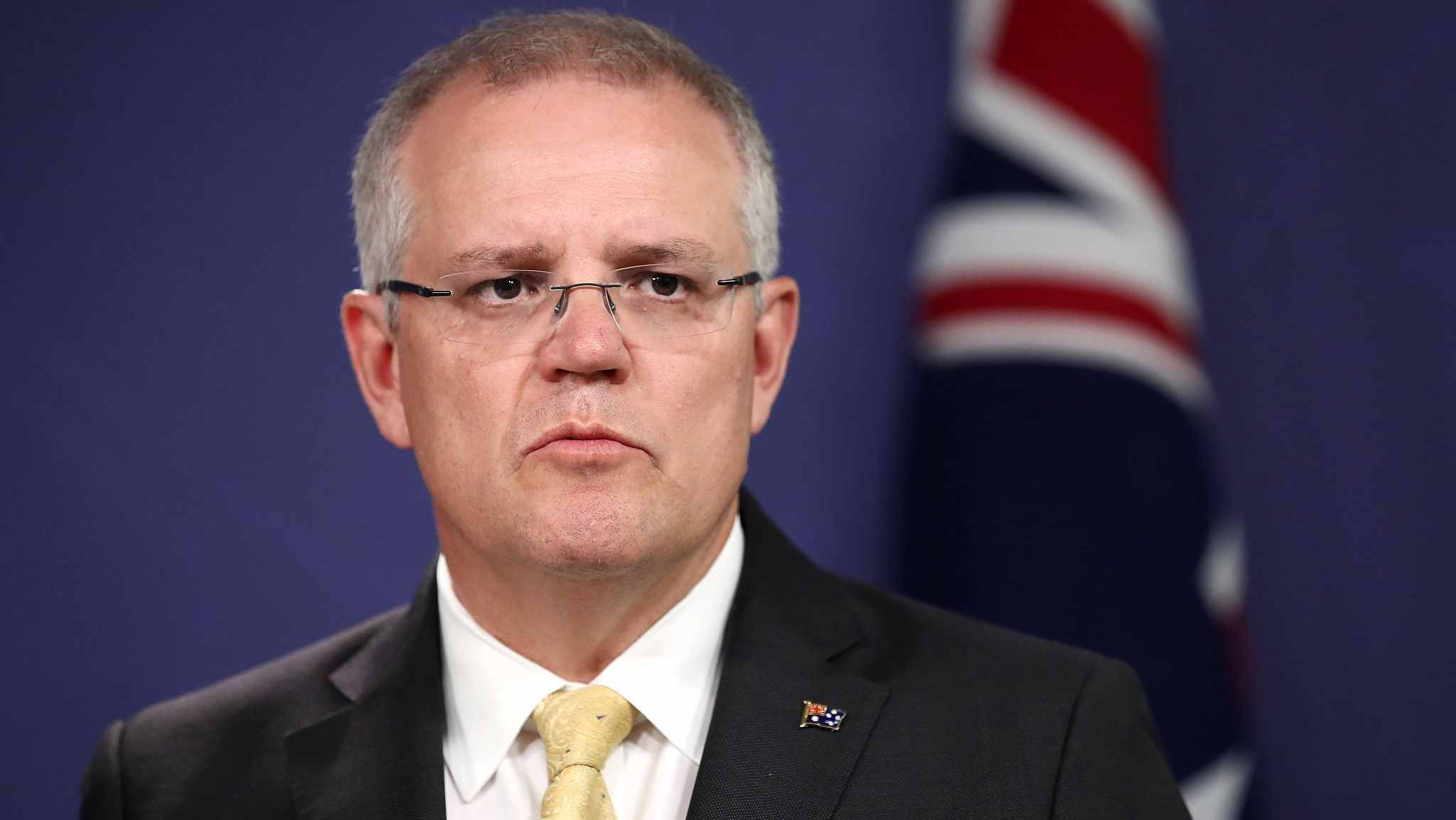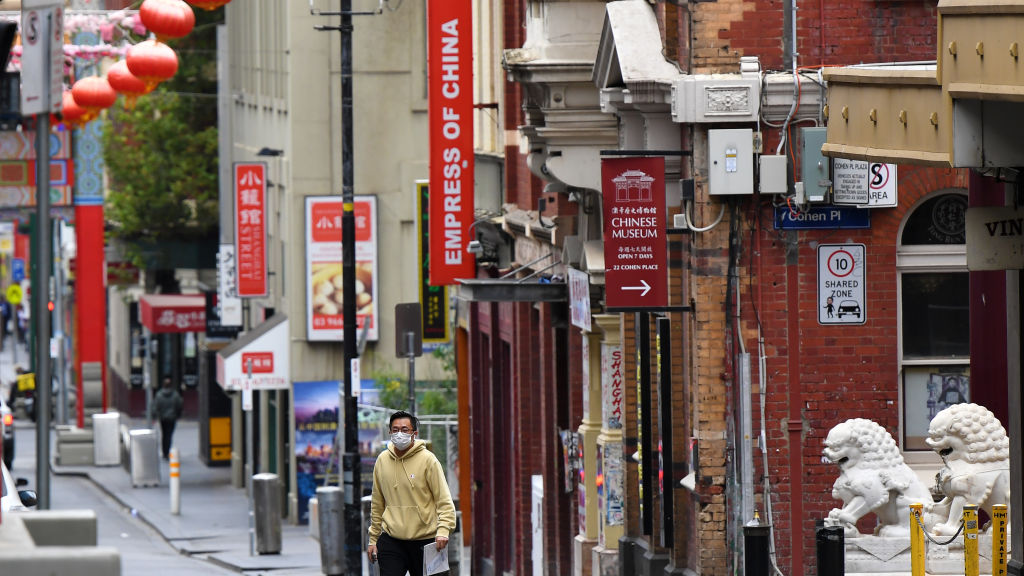
Australian Prime Minister Scott Morrison. /VCG
Australian Prime Minister Scott Morrison. /VCG
Editor's note: Daryl Guppy is an international financial technical analysis expert and special consultant to AxiCorp. He has provided weekly Shanghai Index analysis for media for the Chinese mainland for more than a decade. Guppy appears regularly on CNBC Asia and is known as "The Chart Man." He is a national board member of the Australia China Business Council. The article reflects the author's opinions and not necessarily the views of CGTN.
Australian Prime Minister Scott Morrison has proposed five initiatives to beef up a new "cold war" against China. His bellicose speech delivered to the USAsia center in Perth failed to mention the most significant proposal that would mitigate against the new cold war that he seems intent on promoting.
First, Morrison proposed an overhaul of the World Trade Organization (WTO), including reviving its appellate trade settlement body after former U.S. President Donald Trump refused to appoint new judges. Never mind that Morrison was absolutely silent on this issue when it first developed.
Second, Morrison lamented that China's advances had eroded the technological edge enjoyed by the United States. His solution is not to step up to the competition but to seek to restrain and pull back China's advances and by implication, deny China the right to improve living standards through advances in technology.
Third, he called on the Group of Seven (G7) nations, of which Australia is not a member, to do more to build infrastructure and provide financing. This call was made despite the cutbacks that his government has consistently imposed on these programs. He ignored the work done by the Asian Infrastructure Investment Bank, of which Australia is a member and continued to present the false assertion of debt entrapment by China. This assertion ignores the structure of sovereign debt obligations in the region, which draw on private, institutional and sovereign sources.
Fourth, he spoke of "building sovereign capacity and resilience by bolstering defense forces, security and trade partnerships." In this vision, trade is not seen as an instrument of peace but as part of a defense solution.
It's no surprise that these proposals clearly echoed the "drums of war" speech given a few weeks before by Home Affairs Secretary Michael Pezzullo. These sentiments were never disavowed by Morrison or his colleagues. It appears they have their hearts set on conflict despite their protestations to the contrary.
In a final irony, he claimed that the liberal democracies wanted to "maintain an open rules-based global system that supports peace, prosperity and aspirations for all sovereign nations."

Chinatown in Melbourne, Australia, March 25, 2020. /Getty
Chinatown in Melbourne, Australia, March 25, 2020. /Getty
It is apparently just an unfortunate oversight that the open, rule-based global system does not include inviting China to the table to participate in the discussions. Nor does it appear to acknowledge China's right to continue to develop prosperity for its people via technological advancements. Morrison's vision does not recognize China's aspirations as a sovereign nation.
The very real danger is that Morrison and his cohort of like-minded, aging imperial powers will provoke an armed conflict in the region. Despite their protestations, there is a growing thirst for conflict rather than diplomatic solutions. Some members of this coalition to whom Morrison is addressing his comments have a history of such provocation.
The United States used the fabricated Tonkin Incident off the coast of Vietnam to justify bombing attacks on North Vietnam. The Japanese used the infamous Marco Polo Bridge incident to justify their further attacks on China. Reaching further back into history, the English used the arrest of Chinese crewmen on the Arrow as an excuse for the Second Opium War.
These are the real dangers that underpin Morrison's call for active cooperation among like-minded countries and liberal democracies not seen for 30 years. This risk of miscalculation grows as the saber-rattling increases. Encouraging old and aging European imperial powers like France and English to sail warships through the South China Sea is a return to primitive gunboat diplomacy and not designed with cooperation in mind.
However, this China-prodding is unlikely to be wholeheartedly supported by other nations in the region. The recent attempt to turn the Association of Southeast Asian Nations (ASEAN) meeting into an attack on China was not supported by other ASEAN members.
Mitigating this so-called cold war with China is not achieved by containment. The solution comes through inviting China to take a seat at the table where the global rules-based order is created. China cannot be excluded from these discussions. It has a legitimate role to play and a voice that must be heard.
Prime Minister Morrison proposes to take this cold-war confection to the G7. While he will garner support from the U.S. and the UK, it can only be hoped that others in the grouping are more levelheaded and have a deeper understanding of how global rules can only be based on cooperative discussions. These are not rules that can be imposed.
Security and peace in the region depend upon the active and honest involvement of China in all these discussions. A more informed speech would have included an Australian commitment to support and sponsor China's direct involvement in these global forums.
Instead, the speech reflected a desperate longing for a world as it was, with all its Western imperial splendor, and not the world as it is.
(If you want to contribute and have specific expertise, please contact us at opinions@cgtn.com.)

